CLTS Foundation Global has kick-started scaling up institutional triggering with Government of Haryana and World Bank beginning at Karnal district in a bid to boost efforts of elimination of open defecation in the state under Swachh Bharat Mission Gramin.
This first institutional triggering exercise followed by a field visit was part of a series of interventions in the state of Haryana wherein CLTS Foundation Global is working in association with World Bank and Govt. of Haryana to scale up community-led total sanitation in a phased wise manner in all the districts of the state to eliminate open defecation.
A five-day Training of Trainers on the CLTS approach was held in Haryana Institute of Rural Development (HIRD), Nilokheri, Karnal district, Haryana from 15 – 19 November 2016 with half a day strategic meeting with the DCs, ADCs of the participating district in the presence of the ACS of Haryana.
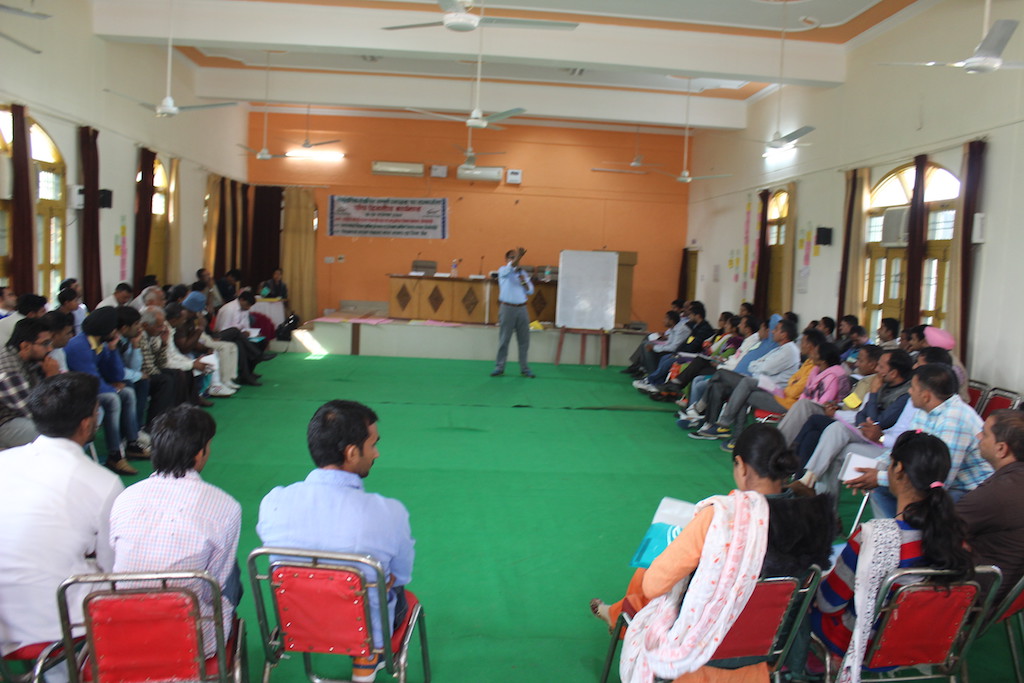
Dr. Kamal Kar leading a session with the participants during the second day of the workshop.
The training was part of the World Bank project where CLTS Foundation Global has been involved as a technical expert to provide institutional support in building capacity to strengthen and accelerate the implementation of Swachh Bharat Mission (Gramin) mission in Haryana.
Tackling Open Defecation by Scaling-Up CLTS
This is one of the first training out of the four such planned institutional triggering exercises to be held in Haryana.
The training was attended mostly by motivators, block motivator, cluster coordinators, district coordinators from eight district of Haryana namely Karnal, Sonipat, Jind, Kaithal, Bhiwani, Ambala, Hisar, Bhiwani and Rohtak. Some of the students and professors from the MSW department of CBLU Bhiwani also attended the workshop.
The training began with the inauguration and welcoming of the participants by Dr. Puran Singh, Director, HIRD and Mr. RK Mehta, State Coordinator, SBM (G). Dr Singh remarked in his speech about how Haryana is moving fast towards the goal of ODF state by following the examples set by Himachal Pradesh and Kerala. Mr Mehta encouraged the participants to work hard and learn as much as possible from the training. Dr. Singh further exhorted the participants to pay attention to the tools that they will learn during the workshop and mentioned the importance of making ODF a way of life.
Dr. Kamal Kar, Chairman, CLTS Foundation Global set the context of the workshop with a brief overview of what was happening in India and its neighbourhood in the sanitation sector.
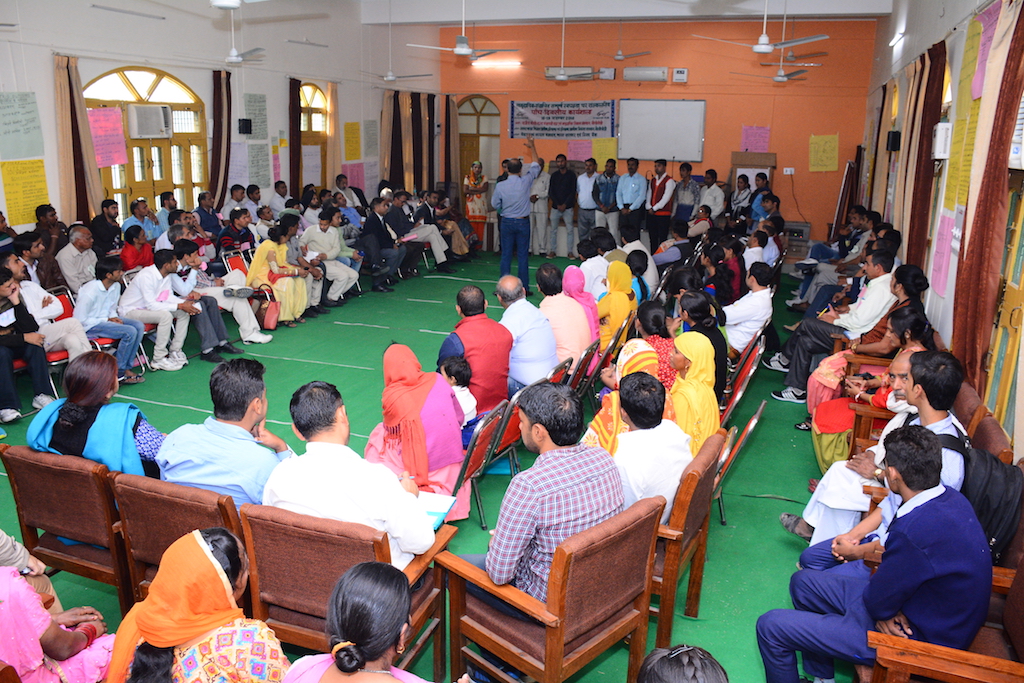
The first two days of the trainings covered the theoretical aspects of the training where the basic of CLTS approach and CLTS tools were oriented. It was done through various medium like role play, groups works and presentations.
By the end of the two days it was realised that the participants had a different definition of the CLTS approach. Although they had been working in the field, majority of the participants had a rather misplaced and wrong notion/ understanding of CLTS and wrong messages were passed on to the villages through their field visits. Effort was made to make the participants unlearn and understand the true meaning of CLTS approach. It was also observed that the there was no clear understanding of what ODF village/ block/ district meant and how it could be verified by declaration although 7 district of Haryana have been declared an ODF districts.
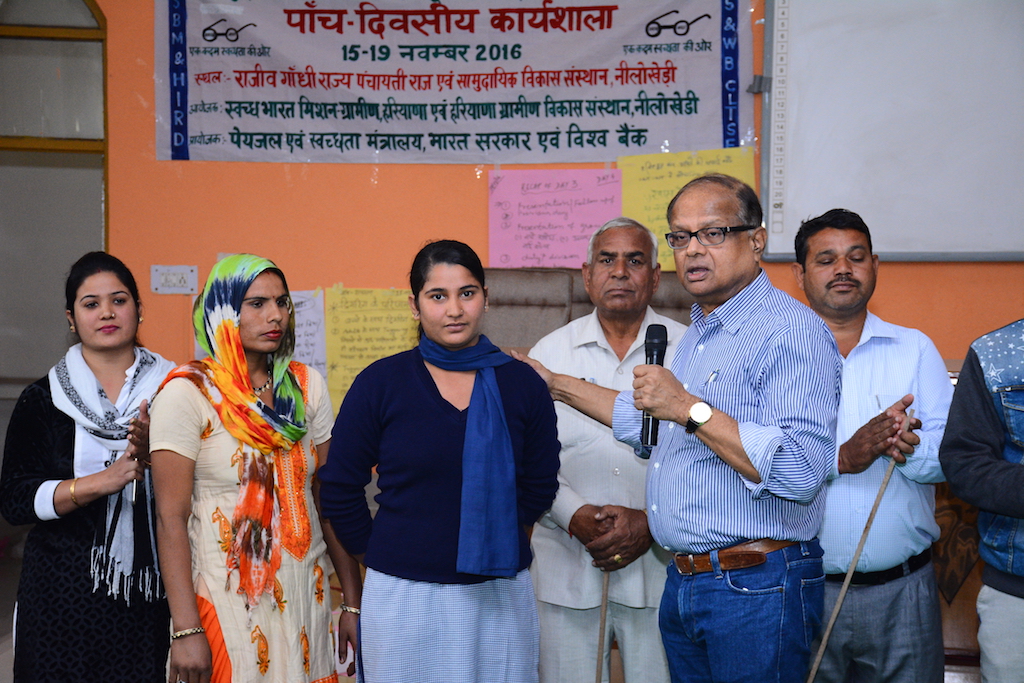
Dr Kamal Kar with one of the Natural Leader who emerged during the triggering exercise in the village. A school girl who has decided to stop open defecation in her village.
It was emphasized that the community must not only be involved but take the lead in all the sanitation and behaviour change activities. The attempt was to convey to participants that “we are not there to make the people learn or understand or to lecture them, but we are there only to facilitate the process of self-analysis of their sanitation behaviour”. Dr Kar stressed the fact that everybody has the ability to understand and nobody wants to eat faeces whether they are poor or rich.
During the training, the participants pointed out that Nirmal Gram Puruskar and Swachh Bharat Mission have many similarities in their approach. It seems like putting old wine in a new bottle–which is a reason why SBM may not achieve its objectives in a sustainable way if the approach is not changed from Government-led to Community-Led. Dr. Kar delineated the similarities of approach and strategy in all previous sanitation programs implemented in India over the past thirty odd years including CRSP, TSC, NBA and SBM (G), and how the pressure of declaring ODF in recent time without any consideration for sustainability has hindered the programme in obtaining its own objective of Swachh Bharat Mission. He emphasized how it is important to link health outcomes with the ODF declaration.
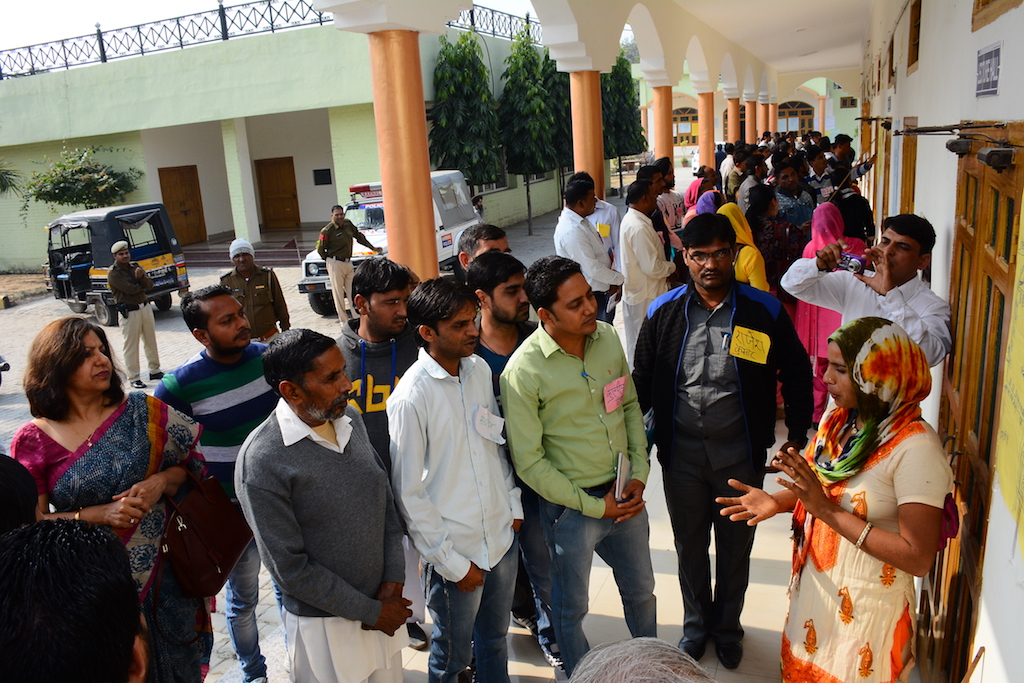
Community presentation
On the third and the fourth day of the training triggering activity were carried out in 12 villages in Karnal district as part of the training simulation exercise. There were two videographers who followed the participants in their field visit and recorded activities in the field. After the visit they were given feedback based on these videos and observation made by the trainer during the activity. These videographers also recorded construction of toilets in few of the households who were triggered during the field exercise.
On the 5th day of the training, there was a presentation by the representatives from this 12 triggered villages. Most of the representatives were village Sarpanch along with the natural leaders that emerged during the triggering exercise. Each of the villages were given a stall where they presented detail plan on making their village ODF and also set deadlines for declaration of ODF.
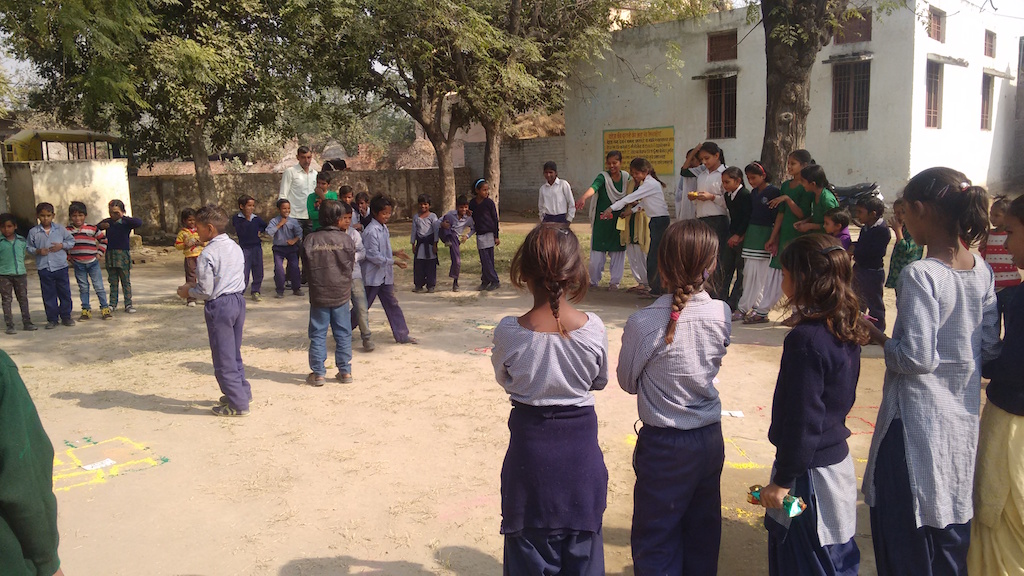
Triggering exercise in a village in Karnal district of Haryana.
The last of the training were also attended by the DCs and ADCs of the 8 districts along with the Additional Chief Secretary, Govt. of Haryana, Navraj Sandhu. During the session the participants from each district made a district level plan and presented in front of the higher officials. They also shared challenges of pressures which come from the higher officials to make the village/block ODF. A detailed discussion on the approach and programme design was done.
Ms. Sandhu assured that they would give a serious consideration to make suitable changes in the implementation strategy, and the higher officials will address the issue faced by the front line workers. She also mentioned that the focus will now be on sustainability and involvement of community rather than on hasty declaration of ODF, and she encouraged the participants to work with complete sincerity to bring Haryana on the path of cleanliness.
Some of the key highlights of the trainings are as follows:
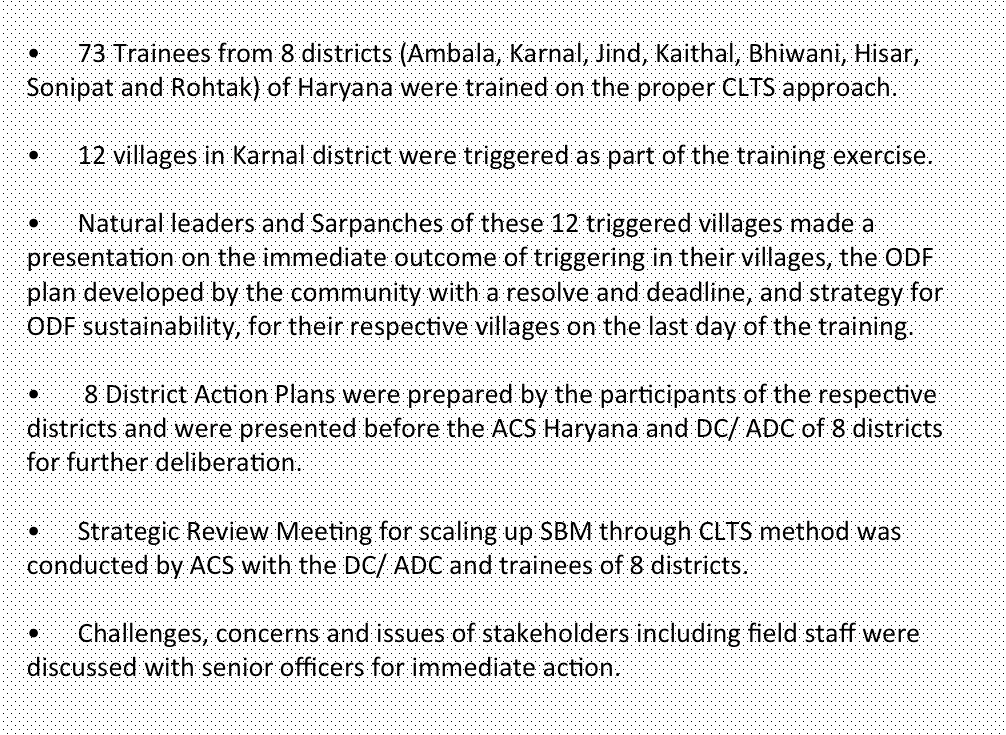
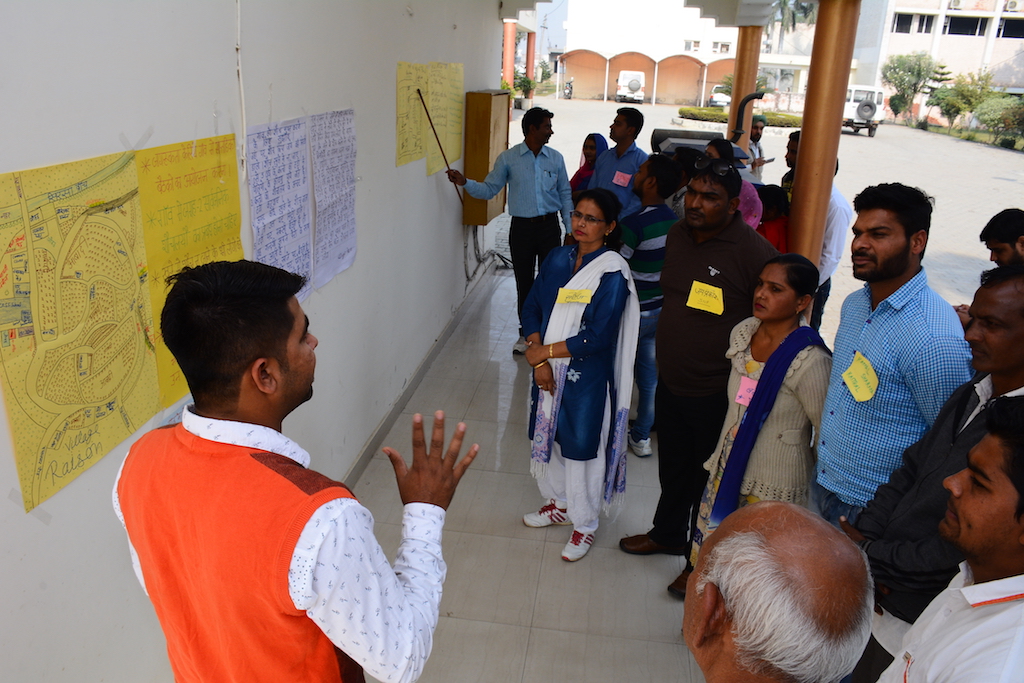
Community presentation during the triggering exercise.
The following recommendations were made after the training:
- The orientation of senior district level personnel, intensive training to prepare master trainers for triggering the communities and as well as to impart training to grass root staff about their roles is required.
- Involving social work students as part of their curriculum to work as motivators at the field level would be useful. During the training, the social works student from CBLU Bhiwani proved to be a good resource and like Bhiwani, other districts can also utilize this untapped resources.
- The orientation of senior officers like the DCs and ADCs on the CLTS approach to help them strategize and make district level plans.
- Clear guidelines on how ODF status will be assessed/ verified to ensure the core essential elements are being addressed which needs to be buttressed by independent third party verification. This will ensure both more rigorous verification and function as a safeguard against declarations that are hastened to show achievement but have compromised sustainability.
- Selecting a pool of master trainers who have good communication skills and are deeply interested in better sanitation outcomes regardless of their formal vocation/ employment. The master trainers developed through the ToT can be used to both trigger communities as well as to impart the necessary orientation to grass root motivators on the ground about their roles. A structured module adapted from the ToT module would be useful for this purpose of orienting grassroots.
- Male – female ratio of the pool of master trainers should be more proportionate.
The training ended on a positive note with the ACS, Haryana and other DCs and ADCs taking cognizance of many of the issues raised by the field staff and ensuring change in their approach and planning. The next training is schedule from 12-16th December where many DCs and ADCs and other officials of the participating districts are expected to attend workshop. This training workshop helped in understanding sanitation scenario in some of the districts in Haryana. It also helped in identifying some of the loopholes and challenges in the field to plan a way forward for the state to bring Swacch Bharat Mission on the right track.
By Delhi Rose Angom. She is a programme officer with CLTS Foundation Global.

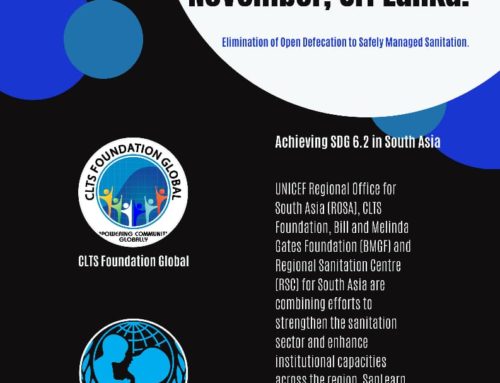

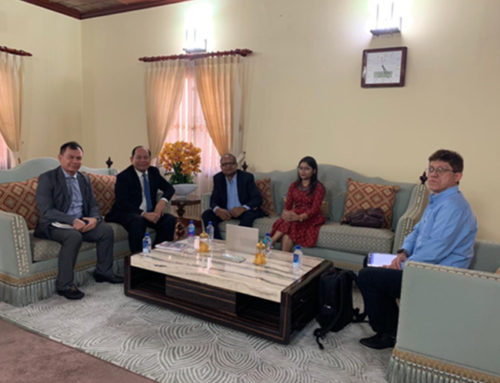
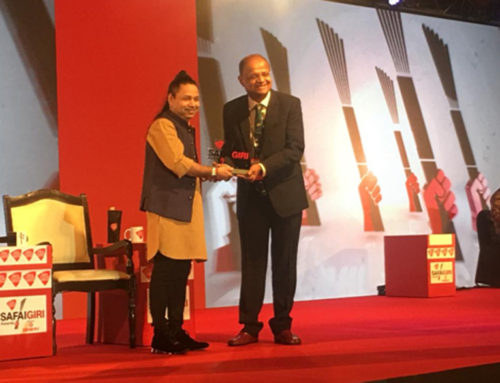

Leave A Comment